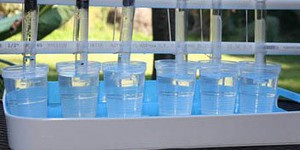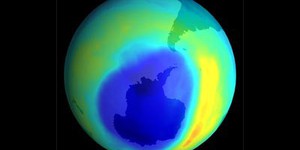Weather & Atmosphere Science Projects (28 results)
Everybody talks about the weather, but nobody does anything about it.
- Charles Dudley Warner
Weather and atmospheric science offer lots of opportunities for interesting explorations. It's a satisfyingly complex area, with lots of online resources so you can make your project as easy or as advanced as you want. And when you're done, you'll have a science fair project everyone can talk about.
|
Select a resource
Sort by
|
Have you ever noticed that on a hot day, it's more comfortable to wear a light-colored shirt than a dark one? Or that it's cooler in a park than walking down a street? This happens because different surfaces absorb and reflect heat in different ways. Urban heat islands are parts of cities where man-made surfaces like pavement and buildings replace natural surfaces like grass and trees. In this project, you will use temperature and satellite data to see if certain areas in a city have higher…
Read more
Featured
Have you heard that garlic powder is supposed to inhibit the growth of bacteria? Which do you think would make a better disinfectant: a solution of garlic powder or a solution of bleach? This project shows you a straightforward way to compare the effectiveness of different disinfectants (or other antimicrobial agents), by measuring zones of inhibition on a culture plate.
Read more
On a windy day it is hard to keep your hat on! The power of the wind can even be strong enough to power large wind turbines to make electricity! In this experiment, find out how you can make your own instrument to measure the speed and power of the wind. How does it work?
Read more
New
Artificial intelligence (AI) programs can now generate photorealistic pictures of people who do not exist in the real world. How can you tell if a picture is of a real person or a fake, AI-generated person? What features of the picture do people use to decide whether the face is real or AI-generated? In this project, you will explore these questions as you ask volunteers to look at both real and AI-generated pictures of human faces.
Read more
Tornadoes are a very destructive weather phenomenon that is very hard to predict. Certain weather conditions can indicate if a tornado is likely to occur, but the path that the tornado will take is completely unpredictable. Storm chasers are people who chase tornadoes and try to capture them on film or video. They often have a sense of predicting where and when a tornado will strike, but the best images are also due to a bit of luck and survival instinct. Even though tornadoes are…
Read more
Earth's atmosphere, the ocean of air that blankets the planet, is mostly nitrogen and oxygen, with small amounts of other gases. How much oxygen is present in air at sea level? In air high up in the Appalachians or Rockies? Atop Mount Everest? How much oxygen is present in the air you breathe? Here's a project that shows you how to measure the percentage of oxygen in an air sample.
Read more
Does your hair go crazy when the weather turns damp? Did you know that strands of hair can relax and lengthen when the humidity increases and then contract again when the humidity decreases? In fact, hair strands can be used as the basis for a hygrometer, a device which measures the humidity level in the air. Will a hygrometer help you to predict bad hair days(!) or can you use it to help predict the weather?
Read more
Smog days are often posted in your local newspaper. Check how many smog days your city has had in the last year. How does it compare to to other years? You can also take pictures of your city landscape on high and low smog days. How do the pictures compare? How does smog in the atmosphere affect visibility? What is smog made of? You can use tongue depressors smeared with Vaseline to check for smog particles in different areas; just stick in the ground and look at them a few days later. …
Read more
Before you head for school for the day, you might check the weather to see whether or not you need to wear a jacket or bring an umbrella. It is pretty easy for you to check the TV or internet to see what the weather will be like today, tomorrow, or even next week. The modern-day science of meteorology, or studying and predicting the weather, has many advanced tools at its disposal that make it easy for you to get this information.
How did people predict the weather before the invention of…
Read more
The ozone layer is important for blocking most of the harmful radiation that comes from the sun. You can find maps of the ozone layer and compare different regions of the globe for ozone coverage. Where are the problem areas? Is there a difference in ozone coverage between different hemispheres? Between populated and un-populated areas? In atmospheric regions over land masses or over bodies of water? Some scientists think that aerosols in the air are breaking down the ozone layer. You can do…
Read more
Do you live in an area where the weather changes a lot from season to season throughout the year? Or do you live in a place where the weather stays pretty much the same all year long? How dynamic is the weather, and how does it compare to climate? In this experiment you can use the Internet to conduct your own investigation about how climate and weather in your local area change over time.
Read more
From the name, you might guess that a psychrometer is an instrument designed to measure your thoughts. Psych! Actually, it is an instrument that can help you forecast the weather. Read more to find out how it works.
Read more
|
Explore Our Science Videos
Make a Thermometer - STEM Activity
How to Make a Homopolar Motor - Science Experiment
Extract Iron from Cereal– Science Project













